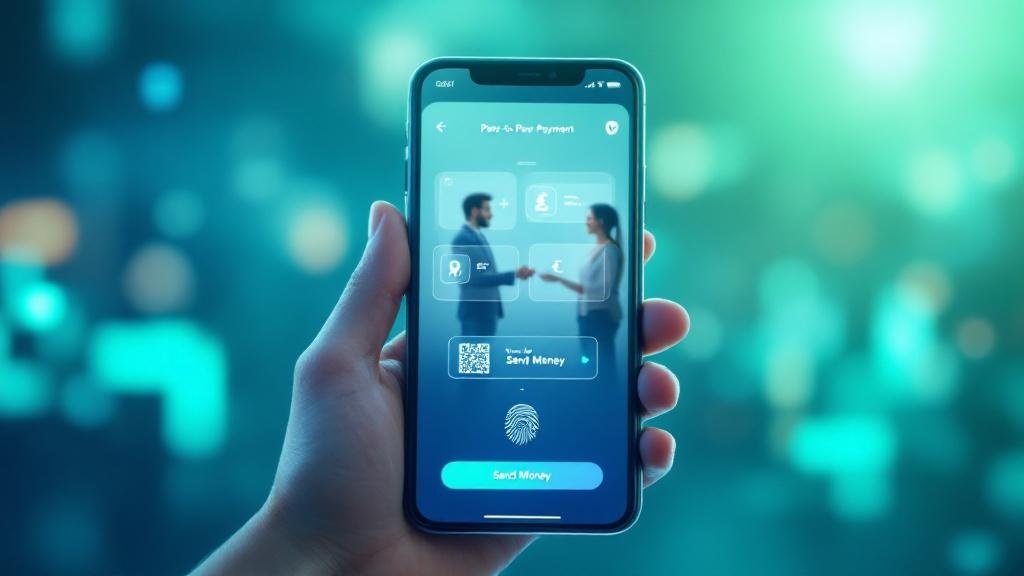In today’s fast-paced, cashless world, digital wallets for peer-to-peer payments have become essential. Whether you’re splitting dinner with friends, paying rent, or sending money across the globe, peer-to-peer (P2P) payment apps make it fast, secure, and incredibly simple.
But with so many P2P payment solutions on the market, how do you know which one is best for you?
This guide breaks down the top digital wallets for person-to-person payments, analyzing their features, security, fees, and user experience. By the end, you’ll know exactly which mobile wallet for money transfer fits your lifestyle and needs in 2025.
🧾 What Is a Digital Wallet for Peer-to-Peer Payments?
A digital wallet is a software-based system that securely stores users’ payment information and passwords for numerous payment methods. It allows for real-time fund transfers directly from one person to another using just a phone number, email, or QR code.
P2P digital wallets are often part of a larger mobile payments ecosystem, making them ideal for:
-
Splitting bills or sending money to friends
-
Paying freelancers or gig workers
-
Covering shared expenses
-
Sending cross-border remittances
-
Bank-to-bank transfers without needing account details
🚀 Top Picks: Best Digital Wallets for Peer-to-Peer Payments in 2025
Here are the most trusted and widely used P2P wallets with bank integration, instant transfers, and strong security.
1. PayPal – The Global Standard for P2P Transfers
Why it’s great:
PayPal is a veteran in the digital wallet world, ideal for both local and international money transfer apps.
Key Features:
-
Supports cross-platform digital wallets
-
Send via email or mobile number
-
Bank and card integration
-
Payment app encryption with 2FA
Pros:
-
Recognized globally
-
Buyer and seller protection
-
Easy currency conversion
Cons:
-
Fees for credit card-funded payments
-
Exchange rates not always favorable
Best for: International P2P remittance services and freelancers
2. Venmo – Best for Social P2P Payments
Why it’s great:
Owned by PayPal, Venmo combines mobile wallet functionality with a social media-like feed, making person-to-person payments fun and friendly.
Key Features:
-
Instant transfer to bank
-
Fun payment feed and emojis
-
QR code payments in-app
Pros:
-
Great UI for millennials and Gen Z
-
No fee for bank-funded transfers
-
Easy integration with other apps
Cons:
-
U.S. only
-
Public feed may concern privacy-conscious users
Best for: Casual, domestic peer-to-peer money transfers
3. Google Pay – Simple and Secure for Android Users
Why it’s great:
As part of Google’s ecosystem, it offers seamless contactless payments, bank-to-bank transfers, and excellent integration.
Key Features:
-
Built into Android
-
Digital transaction security with encryption
-
P2P transfers using phone number or email
-
NFC tap-to-pay support
Pros:
-
Zero fees for transfers
-
Highly secure with fingerprint/face unlock
-
Loyalty and rewards integration
Cons:
-
Limited iOS functionality
-
Some bank restrictions outside India/U.S.
Best for: Android users seeking a secure digital wallet for P2P
4. Cash App – Best for Investing & Payments Combo
Why it’s great:
Cash App isn’t just a P2P payment app; it’s also a stock and Bitcoin trading platform.
Key Features:
-
Real-time P2P payments
-
Free debit card
-
Invest in stocks and crypto
-
QR code and $Cashtag payments
Pros:
-
Instant transfers
-
Easy to use
-
No monthly fees
Cons:
-
U.S. and U.K. only
-
Customer support can be slow
Best for: Users wanting P2P money transfer without fees + investing
5. PhonePe (India) – Best UPI-Based Wallet
Why it’s great:
In India, PhonePe dominates as a mobile wallet for money transfer with direct UPI integration.
Key Features:
-
UPI for bank-to-bank transfers
-
Utility bill payments
-
Investment and insurance options
-
QR payments in stores
Pros:
-
Real-time fund transfers
-
No fees for UPI
-
Secure with biometric login
Cons:
-
India-specific
-
Occasional downtimes during peak hours
Best for: Users in India using UPI and QR code payments
🔐 Security Matters: How Safe Are P2P Digital Wallets?
Security is a top concern when transferring funds. Here’s how top P2P payment solutions protect your money:
🔒 Common Security Features
-
Two-Factor Authentication (2FA)
-
End-to-End Encryption
-
Fraud Detection Algorithms
-
Instant transaction alerts
-
PIN or Biometric Login
Tip: Always use a secure digital wallet for P2P that offers encryption and 2FA.
💳 What to Look for in the Best P2P Payment App
When choosing a digital wallet for peer-to-peer payments, consider:
✅ Key Factors
-
Transfer speed (real-time or delayed)
-
Transaction limits
-
Bank or card integration
-
Fee structure
-
User interface
-
Security protocols
-
Global vs. local usage
🧠 Real-Life Example:
Ayushi, a freelancer in Mumbai, uses Google Pay for client payments and PhonePe for rent and utility transfers. With UPI integration, she avoids transaction fees and gets real-time confirmation.
📱 Upcoming Trends in P2P Digital Wallets (2025 and Beyond)
-
Voice-activated money transfers
-
AI fraud detection
-
Multi-currency wallets
-
Biometric authentication as standard
-
P2P crypto transactions
🙋 FAQs: Digital Wallet for Peer-to-Peer Payments
1. What is the best digital wallet for P2P transfers without fees?
Apps like Cash App, Google Pay, and PhonePe offer P2P money transfer without fees, especially when using bank accounts or UPI.
2. Can I send money internationally using P2P wallets?
Yes. PayPal, Wise, and Revolut support cross-platform digital wallets with international transfers. Be mindful of currency conversion fees.
3. How secure are person-to-person payments on mobile wallets?
Most P2P wallets use strong digital transaction security, including payment app encryption, biometric access, and instant alerts.
4. Do digital wallets work across banks?
Yes. Many P2P wallets with bank integration allow bank-to-bank transfers, even across different institutions.
5. Can I use QR code payments for P2P transfers?
Absolutely. Apps like PhonePe, Venmo, and Cash App support QR code payments for fast and contactless P2P transfers.
6. Which mobile wallet supports contactless P2P payments?
Google Pay, Apple Pay, and Samsung Wallet offer contactless payments, and also support P2P transfers using phone proximity or tap.
7. What’s the difference between a mobile wallet and a P2P app?
A mobile wallet stores payment methods and allows tap-to-pay, while a P2P app focuses on transferring money between individuals. Many apps now offer both.
🧾 Final Thoughts
A reliable digital wallet for peer-to-peer payments is more than a convenience—it’s a financial tool that saves time, avoids fees, and keeps your transactions secure.
Whether you’re using Venmo to split dinner, PayPal to pay overseas freelancers, or PhonePe for UPI payments, there’s a P2P payment app tailored to your needs.
Choose wisely, stay secure, and make every payment as simple as a tap.
🧠 Pro Tip:
Use multiple digital wallets for different purposes—one for everyday transfers, one for international remittance, and another for secure bank-to-bank transfers. Diversifying your apps helps you get the best of all features!








Comments (0)